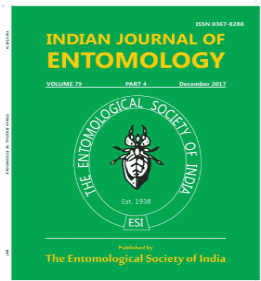Seasonal Incidence of Helicoverpa armigera on Sunflower
DOI:
https://doi.org/10.55446/IJE.2024.1661Keywords:
Capitulum borer, yield loss, correlation, regression, economic threshold level, Helicoverpa armigera, monitoring, weather factorsAbstract
Helicoverpa armigera (Hubner). the sunflower head borer, poses a significant threat as it can cause extensive damage by feeding on flower heads and seeds. Its presence can lead to yield losses. Effective IPM strategies are crucial to mitigate the impact of H. armigera infestations and ensure the profitability and sustainability. Monitoring pests is crucial for timely intervention and to minimize crop damage and optimize yields. The present field experiment was carried out during 2021 to study the seasonal incidence of H. armigera on sunflower. Result revealed that incidence of H. armigera was observed during 50th standard meteorological week which reached to peak during 7th SMW. However, it crossed the ETL during 4th SMW. In relation to weather parameters, H. armigera showed positive correlation with maximum temperature (r = 0.557*), while it was negative with evening relative humidity (r = - 0.605*). Further, multiple regression was carried out and it revealed that environmental factors influenced about 70.10% H. armigera incidence in sunflower.
Downloads
Metrics
Downloads
Published
How to Cite
Issue
Section
References
Andrew R L, Kane N C, Baute G J, Grassa C J, Rieseberg L H. 2013. Recent nonhybrid origin of sunflower ecotypes in a novel habitat. Molecular Ecology 22(3): 799-813. https://doi.org/10.1111/mec.12038.
Basit M, Saeed S, Saleem M A, Zulfiqar R. 2016. Population dynamics of sunflower insect pests and their natural enemies. Sarhad Journal of Agriculture 2(4): 417-423.
FAOSTAT. 2020. http, //www.fao.org/faostat/en/#data/QC
FAO STAT. 2022. https://www.fao.org/faostat/en/#data/QCL
Gore S H, More D G, Bhokse D V, Fand D N. 2021. Determine the economic threshold level for Helicoverpa armigera Hubner infesting sunflower. The Pharma Innovation Journal SP-10(12): 1577-1579.
Gonzalez-Martin I, Villaescusa-Garcia V, Lopez-González F, OizJiménez C, Lobos-Ortega I A, Gordillo A B, Hernández-Hierro J M. 2013. Control of quality and silo storage of sunflower seeds using near infrared technology. Grasas Aceites 64(1): 30-35.
Indiastatagri. 2022: https://www.indiastatagri.com/
Kachhawa D, Rana S B, Swaminathan R. 2016. Seasonal incidence of Helicoverpa armigera (hubner) in chickpea ecosystem in correlation with weather parameters. The Bioscan 11(4): 2227-2230.
Lewin H D, Thandavarayan S K, Sundararaju D. 1973. Studies on common and destructive pests of sunflower (Helianthus annus L.). Pesticide 7(4): 17-18.
Ojha P K, Kumari R, Chaudhary R S. 2017. Impact of abiotic and biotic factors on population dynamics of Helicoverpa armigera Hubner (Noctuidae, Lepidoptera) in chickpea. Journal of Entomology and Zoology Studies 5(1): 636-642.
Panchabbhavi K S, Karishanamoorthy P N. 1978. Estimation of avoidable loss by insect on sunflower at Bangalore. Indian journal of biological science 48: 264-265.
Rajmohan N, Ramkrishnan C, Subramaniam T R. 1974. Some insect – pests of sunflower in Tamil Nadu. Madras Agriculture Journal 61(6): 187-188.
Rangarajan A V, Mahadevan N R, lyemperumal S. 1975. Pest complex of sunflower (Helianthus annuus L.) in Tamil Nadu. Indian Journal of entomology 37: 188-191.
Sharma S, Chandra U, Veer R, Kumar S, Yadav S K, Kumar A. 2020. Study on population dynamics of Helicoverpa armigera (Hubner) in chickpea. Journal of Entomology and Zoology Studies 8(5): 629-632.















